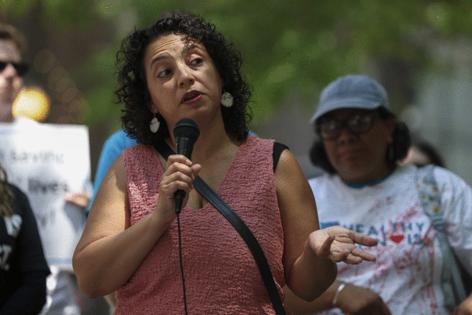Illinois House OKs measure to give mental health workers called to emergencies the same benefits as other first responders
Published in News & Features
SPRINGFIELD, Ill. — Lawmakers are moving ahead with a measure that would make mental health professionals who get sent on emergency calls alongside law enforcement eligible for the same benefits as other first responders if they’re also hurt in the line of duty.
Mental health advocates for years have pushed for a more holistic approach to many emergency calls by having police officers team up with social workers, clinicians or similar practitioners to help quell potentially volatile situations.
When that approach is in practice, mental health workers should be entitled to the same benefits as the police officers who are putting their lives on the line, said state Rep. Lilian Jiménez, the main sponsor of the bill in the House.
“We’re really doing one thing and that is extending benefits to all crisis responders. We’re extending disability benefits, death duty benefits, burial benefits,” Jiménez, a Chicago Democrat, said during House debate on Tuesday. “We’re talking about situations where people are intervening in a crisis situation, and we just want to make sure that the benefits that local municipalities (provide) are equal across the board to crisis responders.”
Under the legislation, the mental health professionals are defined as those persons “employed and dispatched by a unit of local government to respond to crisis calls received on public emergency service lines instead of or in conjunction with law enforcement.”
Jiménez’s bill passed through the Democrat-controlled House on a 80-27 vote and now goes to the Senate for consideration.
Gov. J.B. Pritzker in 2022 signed into law a measure that would eventually create a pilot program for social workers or other mental health professionals to work with police officers during mental health-related emergencies. The pilot was initially intended for Peoria, Waukegan, East St. Louis and Springfield. In Chicago, Mayor Brandon Johnson’s administration has made its own version of the program permanent through its Crisis Assistance Response and Engagement, or CARE, team.
While a handful of House Republicans joined Democrats in voting for the benefits bill, some expressed opposition during the floor debate.
State Rep. Blaine Wilhour, a Republican from Beecher City, questioned whether the co-responders — who are not trained as police officers — receive any law enforcement training “since they’re going to be on the front lines.”
“It’s important if we’re going to be putting these folks in these positions where we feel the need to have legislation for line-of-duty benefits that they would receive that training,” Wilhour said.
...continued
©2024 Chicago Tribune. Visit chicagotribune.com. Distributed by Tribune Content Agency, LLC.







Comments